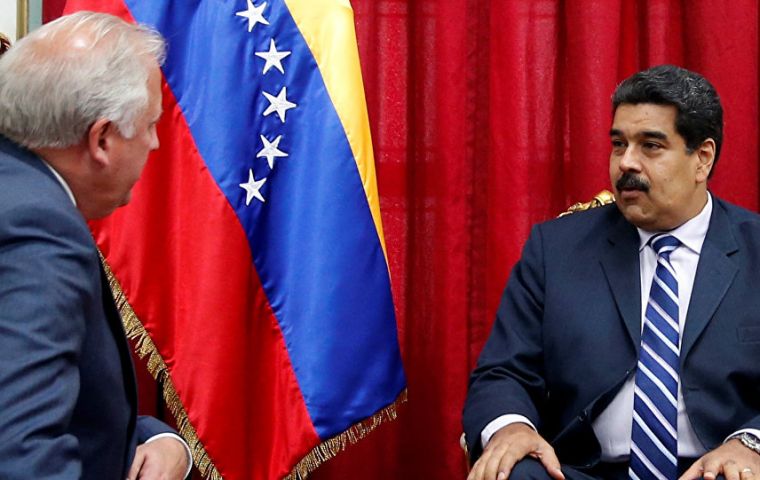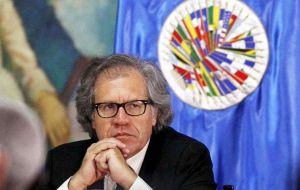MercoPress. South Atlantic News Agency
Maduro-Shannon discuss restarting relations; OAS debates implementing Democratic Charter on Venezuela
 US envoy Shannon and Maduro, met after lunch in the Miraflores presidential palace in Caracas.
US envoy Shannon and Maduro, met after lunch in the Miraflores presidential palace in Caracas.  US Secretary of State John Kerry agreed in talks with Venezuelan Foreign Minister Delcy Rodriguez last week to re-start dialogue.
US Secretary of State John Kerry agreed in talks with Venezuelan Foreign Minister Delcy Rodriguez last week to re-start dialogue.  The Caracas meeting came the day before OAS was to discuss a proposal by its head, Luis Almagro, to invoke the regional body's Democratic Charter
The Caracas meeting came the day before OAS was to discuss a proposal by its head, Luis Almagro, to invoke the regional body's Democratic Charter Veteran U.S. diplomat Tom Shannon spoke for nearly two hours with Venezuela President Nicolas Maduro on Wednesday to re-start relations between the ideologically opposed governments amid a punishing economic crisis in the oil rich country.
Shannon, 57, who led a similar rapprochement last year that stalled over imprisoned protest leader Leopoldo Lopez, also met with opposition figures and civil society activists on his short visit to Caracas.
The US is backing an opposition push to hold a “fair and timely” recall referendum this year that could see Maduro ousted. However, US Secretary of State John Kerry agreed in talks with Venezuelan Foreign Minister Delcy Rodriguez last week to re-start dialogue.
Shannon and Maduro, 53, met after lunch in the Miraflores presidential palace in Caracas. Maduro then took to the stage in front of thousands of supporters in the capital city. Although Maduro has been one of the world's most vociferous critics of the US, Maduro was all smiles as he posed for photos at the presidential palace with Shannon.
Their meeting came the day before the Organization of American States was to discuss a proposal by its head, Luis Almagro, to invoke the regional body's Democratic Charter, which could eventually lead to a vote on suspending Venezuela.
Maduro attacked opposition congress head Henry Ramos for his involvement in the meeting. ”Mr (Ramos) takes his private jet and goes to Washington to conspire against his own country,“ he said during the televised speech.
Shannon met with Ramos on Tuesday afternoon, as well as Henrique Capriles, the two-time presidential candidate who lost to both Chavez and Maduro and is now spearheading the push for a referendum.
Maduro may be hoping the meeting eases international pressure on him, analysts and diplomats said, while Washington likely calculates a rapprochement undermines Venezuela's constant blame on ”imperialist“ foes for the nation's problems.
Shannon, a former US ambassador to Brazil, who speaks Spanish and Portuguese, was likely to press for the release of jailed opponents including Lopez.
After meeting Shannon on Tuesday, Capriles said Maduro was seeking to use dialogue to buy himself time due to his inability to solve Venezuela's worsening economic crisis.
”Someone who has not eaten for five days cannot wait for dialogue,“ he said, referring to widespread food shortages around the nation of 30 million people. ”We're not here for photo ops. Venezuela doesn't have time for that.”
Since Chavez took office in 1999, Venezuela and the United States have gone through cycles of diplomatic fighting followed by generally short-lived eras of reconciliation. They have been without ambassadors since 2010.
Through it all, Venezuela has kept oil flowing north uninterrupted, and is the third biggest US supplier after Saudi Arabia and Canada, according to the latest US data.
The United States has criticized Maduro's government for jailing critics and blocking the opposition-controlled congress as part of attempts to squelch unrest caused by growing shortages of food and many other key goods as well as triple-digit inflation.
In a rare congressional hearing on Venezuela's crisis Wednesday, U.S. lawmakers condemned recents arrests and called on Maduro to release political prisoners. At the hearing, officials defended the White House's decision to impose sanctions on top Venezuela officials last year, a move that Maduro made hay of for months
“The situation in Venezuela today is truly heartbreaking,” said U.S. Representative Jeff Duncan, a South Carolina Republican who is chairman of a House Foreign Affairs subcommittee.
In a Wednesday hearing, Duncan questioned why the U.S. was pursuing high-level engagement with the Maduro administration when it had a “blatant record of controlling all facets of the government.”
U.S. engagement should not be viewed as a “reward,” said Annie Pforzheimer, the acting deputy assistant secretary for the Western Hemisphere bureau.
Pforzheimer told the House panel that Shannon would raise the United States' “strong concerns” about the Venezuelan government during his visit, which also included meetings with the country’s opposition and civil society.
The purpose of the trip is to help foster constructive dialogue that hopefully will lead to solutions to challenges facing Venezuela,” State Department spokesman John Kirby said Wednesday.




Top Comments
Disclaimer & comment rules-

-

Read all commentsAnd nothing about this meeting on either GloboVision or TeleSur, the national propaganda machine. Guess the people don't need to know this. It would after all make MadNiky look like a hypocrite.
Jun 23rd, 2016 - 12:12 pm 0Democratic Charter? On Venezuela?
Jun 24th, 2016 - 01:51 pm 0Commenting for this story is now closed.
If you have a Facebook account, become a fan and comment on our Facebook Page!